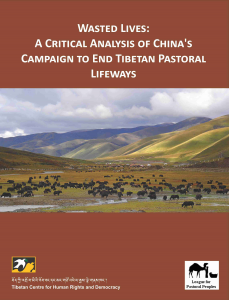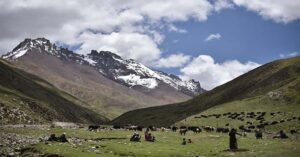 Leading Chinese scientist Professor Min Qingwen published a report last month which ratifies the findings of the Tibetan Centre for Human Rights and Democracy (TCHRD)’s 2015 special report, Wasted Lives: China’s Campaign to End Tibetan Nomadic Lifeways. The TCHRD report showed that while China claims their development policies include environmental protection measures, they are causing environmental degradation and driving numbers of nomads off their traditional lands and into poverty.
Leading Chinese scientist Professor Min Qingwen published a report last month which ratifies the findings of the Tibetan Centre for Human Rights and Democracy (TCHRD)’s 2015 special report, Wasted Lives: China’s Campaign to End Tibetan Nomadic Lifeways. The TCHRD report showed that while China claims their development policies include environmental protection measures, they are causing environmental degradation and driving numbers of nomads off their traditional lands and into poverty.
Professor Min Qingwen is the Deputy Director of the Centre for Natural and Cultural Heritage (CNACH) of the Institute of Geographic Sciences and Natural Resources Research (IGSNRR), Chinese Academy of Sciences, and his report was published on the website of the Chinese People’s Political Consultative Conference (CPPCC). He was looking at China’s sedentarisation policy which has been part of the Chinese policy on the Tibetan grassland since the 1960s, with a stated aim to improve the grassland ecosystem and also the socio-economic situation of nomadic households.
In the report the professor says that China’s national park system, introduced as part of its environmental protection policy, ignored the interests of local residents and the important role their culture and traditional mode of production play in ecological protection. Professor Min also pointed out that in the process of developing national parks, park administrators focus only on the site of the protected area and ignore protection as the goal.
Speaking about Sanjiangyuan –a nature reserve in the Tibetan Plateau which contains the headwaters of three great rivers of Asia: the Yellow, the Yangtze, and the Mekon, the Professor said, “The overemphasis on the relocation of local residents is not only difficult to implement in practice, but also not conducive to ecological protection. The development of national parks should allow local residents to participate as ecological managers.”

Photo taken on June 15, 2016 shows a mountain in Qumarleb (Chumaleb) county in Tibetan autonomous prefecture of Yushu
Photo: Xinhua
“Recently when there were severe snowstorms and heavy snowfall in the Sanjiangyuan area making it difficult for wild animals to forage for food and water, local residents such as lay people and monks came forward and spontaneously organised the transportation of fodder for the starving wild animals. If such an emergency or unexpected situation occurs, a handful of administrators cannot be depended upon to handle the situation”,quoted the professor recounting a recent example from his findings from the Sanjiangyan area where the first national park is set to open in 2020.
Professor Min further suggested that while due importance should be attached to the national park management system and the management model with Chinese characteristics, attention must be paid to protecting the interests of local residents and their excellent traditional culture, and not simply copying experiences of foreign countries.
In China, the biggest grassland country in the world, there are now Chinese scientists speaking up at every opportunity, explaining how the sedentarisation policy has caused only perverse, unintended outcomes, chiefly land degradation. The Chinese Government’s declaration of pasturelands as nature reserves and national parks excluded on paper all human use, but in practice allowed mining to take place in the emptied, depopulated landscapes. The scientists are emphasising that it is possible to be both sustainable and productive without the need to choose one to the exclusion of the other.




 Print
Print Email
Email